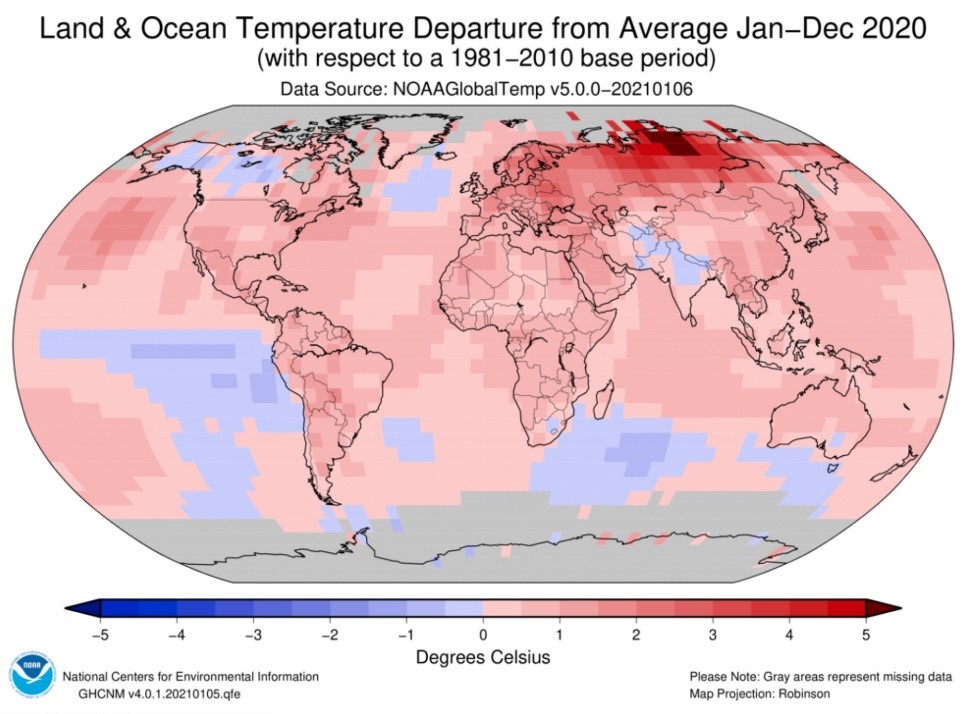Environment Focus
An environmental lens on policies for better lives
2021: Adaptation comes to the fore
By Catherine Gamper and Nicolina Lamhauge, OECD Environment Directorate

We entered 2021, full of hope that the approval of COVID-19 vaccines would bring some respite from the crisis brought about by the pandemic. With manufacturing delays, unequal access and delays in the roll-out of many vaccination plans it is becoming clear that the virus will continue to claim lives and severely affect livelihoods in the foreseeable future.
As governments continue to respond to the simultaneous health emergency and economic crisis, we must learn from our failure to prepare for what has been a well-known (pandemic) risk for many years. And there are other looming global challenges, of which climate change is among one of the most serious.
2020 provided a stark reminder of this urgency: it was on par with 2016 as the warmest year on record. Global temperatures were 1.25°C above the annual average, with all regions feeling the impact, and some locations seeing a staggering 6°C above long term-averages, such as in the Arctic Circle. 2020 also concluded the warmest decade on record.

Changes are being felt on the ground
The historic wildfires in Australia and the western United States in recent years raised questions about the sustainability of the communities residing in the affected wildland-urban interface. Extreme storm events, such as Cyclone Idai in 2019 in Mozambique, are affecting already vulnerable communities. Estimates of the economic losses from these disasters often overshadow the devastating and sometimes irreversible impacts of climate change on peoples’ livelihoods and broader well-being (e.g. physical and mental health, loss of place or identify), as well as on our fragile ecosystems.
Measures to adapt to climate change are indispensable to not only safeguard lives and secure livelihoods, but also contain rising inequalities exacerbated by a changing climate. Disadvantaged and vulnerable populations – including indigenous people, children and the elderly, poor labourers and urban dwellers – are disproportionately affected by climate change in part due to their limited safety nets, and adverse health impacts. A year after Cyclone Idai, nearly 100 000 people across parts of Mozambique, Zimbabwe and Malawi were still living in makeshift shelters; women and girls faced serious health threats due to poor access to basic services and sanitary products.
Adaptation is equally important to safeguard our natural capital. Ecosystems provide for livelihoods, safeguard communities against the impacts of climate variability and extremes, while also being critical for human health and broader well-being. Working with nature is therefore indispensable to addressing the climate emergency.
The last decade has seen significant progress in climate adaptation
We now have robust knowledge of the risks of climate change, as demonstrated by the successive IPCC’s Assessment and Special Reports. Many countries have also produced detailed climate risk assessments, such as through the EU’s Copernicus services, which provide localised projections on the impacts of climate change across different economic sectors and for each country in the EU. These have helped prioritise adaptation action and have informed increasingly innovative approaches to climate change adaptation. In its own work, the OECD has recently examined country approaches to adapting to sea level rise, mainstreaming climate resilience in infrastructure, working with nature to adapt to the impacts of climate change, boosting disaster risk reduction, and better coordinating closely linked policy agendas. To create the enabling environment for such actions, countries have made adaptation a priority through the development of national adaptation plans or strategies that in many cases have been complemented by detailed investment and implementation plans.
However, more is needed to limit and manage the impacts from climate change
UNEP’s recent Adaptation Gap report highlights our limited understanding of the adequacy and effectiveness of adaptation planning. This sentiment has been echoed by members of the OECD Task Force on Climate Change Adaptation who have called for enhanced collaboration on approaches to measure, monitor and evaluate the effectiveness of adaptation policies.
2021 provides us with a tremendous opportunity to accelerate adaptation action. Today, the Climate Adaptation Summit brings together heads of states, international organisations and other stakeholders from around the globe with the shared aim to accelerate adaptation. Later this year, the UK COP26 Presidency has committed to firmly place adaptation as a priority on the international climate agenda. And the UK has led by example and has submitted its first Adaptation Communication to the UNFCCC alongside its Nationally Determined Contribution to demonstrate how the UK will build climate resilience nationally and contribute to these objectives internationally.
To support these efforts, the OECD will continue to work with countries to facilitate peer learning and expert dialogues, to compile good practice approaches, and to translate scientific, economic and social science research into useful insights, guidance and recommendations to policy-makers.
Overcoming the COVID-19 pandemic and the associated crisis must remain a central priority for governments, but climate action is equally urgent and must be an integral component of countries’ economic recovery plans. By placing adaptation firmly at the heart of international policy discussions, the Climate Adaptation Summit will help us path the way to accelerated adaptation actions.
Further reading
Harnessing nature to tackle the climate emergency, OECD Environment Focus Blog
OECD (2021), “Strengthening adaptation-mitigation linkages for a low-carbon, climate-resilient future”, OECD Environment Policy Papers, No. 23, OECD Publishing, Paris.
OECD (2020), “Nature-based solutions for adapting to water-related climate risks”, OECD Environment Policy Papers, No. 21, OECD Publishing, Paris.
OECD (2020), Common Ground Between the Paris Agreement and the Sendai Framework: Climate Change Adaptation and Disaster Risk Reduction, OECD Publishing, Paris.
5 things we learned at the OECD Wildfires Conference, OECD Environment Focus Blog
OECD work on climate adaptation
OECD Task Force on Climate Change Adaptation

Pingback: Harnessing nature to tackle the climate emergency – Environment Focus